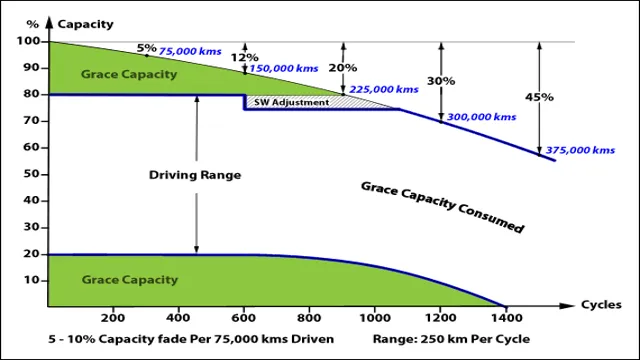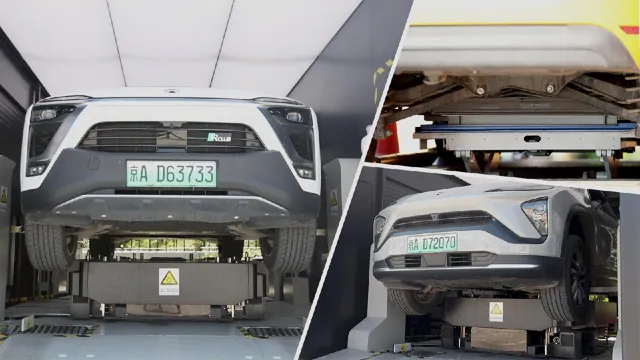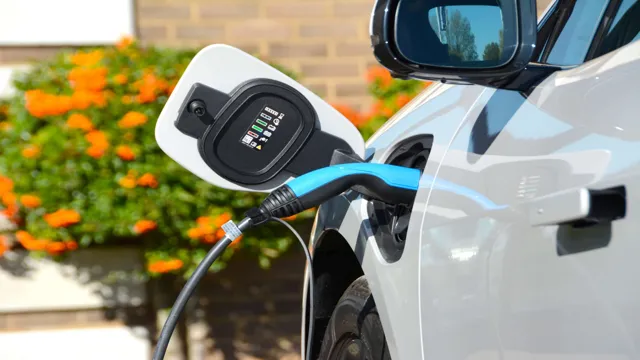Unveiling the Truth about Electric Car Battery Aging: How it Affects Longevity and Performance
Have you ever wondered why the range of your electric car suddenly drops, even though you charged it fully? Or, why your car’s performance is not as impressive as it used to be? The answer lies in the aging of your electric car battery. Yes, just like any other battery, electric car batteries also age over time, leading to a decline in performance and capacity. Electric car batteries are the heart of any electric vehicle, powering the car, and controlling its performance.
Over time, factors like usage, temperature, and charging habits take their toll on the battery, leading to performance degradation. Battery aging is a natural process, but it can impact the range and performance of your electric car if not handled correctly. In this blog, we will explore the various factors that contribute to electric car battery aging and how you can prolong the life of your car’s battery.
From understanding the basics of battery chemistry to managing your charging habits, we will cover everything you need to know to keep your electric car running smoothly for years to come. So, let’s dive in!
What Causes Battery Aging?
Electric car battery aging is a common issue that all electric car owners will eventually have to face. One of the main causes of battery aging is based on how often the battery is charged and discharged. Every time the battery undergoes a charging or discharging cycle, a certain percentage of its overall capacity is lost.
This is known as cycle life, and it is a key determinant of how long an electric car battery will last. Another factor that can contribute to battery aging is temperature. When electric car batteries are exposed to high temperatures for extended periods of time, it can cause the battery to degrade faster than it normally would.
Additionally, factors such as humidity, charging rate, and the age of the battery itself can also impact the life of the battery. Understanding these factors can help electric car owners take steps to maximize their battery life and get the most out of their electric vehicle.
Charging and Discharging Cycles
Battery aging is primarily caused by charging and discharging cycles. When a battery is used to power a device, it slowly discharges its stored energy until it needs to be recharged. Each charging and discharging cycle slightly degrades the battery’s overall capacity, indicating how effectively it can store and deliver energy.
As the cycle count increases, the battery’s ability to hold a charge decreases, leading to a shorter lifespan and eventually requiring replacement. The rate of aging also depends on various factors like temperature, depth of discharge, and charging speed. Higher temperatures speed up the aging process, while frequent deep discharges and fast charging degrade the battery more quickly.
Therefore, it’s essential to charge your batteries correctly and maintain healthy charging habits to avoid premature aging. Ensuring proper charging practices will help maximize your battery life, making it an efficient source of portable power for a more extended period of time.

Heat Exposure
Heat exposure is a significant factor that causes battery aging. High temperatures often accelerate the rate at which batteries age. This is because the heat causes chemical reactions to occur at a faster rate, degrading the battery’s components.
The reactions can cause the internal resistance of the battery to increase, lowering its capacity. This is why it’s essential to store your batteries in a cool, dry place. It will help maintain their life span and reduce the risk of potential damage caused by excessive heat.
Overall, it’s vital to be mindful of the temperature environment your batteries are exposed to, as it can have a direct impact on their longevity.
Time and Age
As we all know, batteries have a limited lifespan, and it doesn’t take long before we start to see significant drops in their effectiveness. This battery ageing process is caused by many factors, including temperature changes, usage patterns, and the passage of time. The age of the battery is a significant factor in determining its performance.
Over time, batteries degrade and lose their effectiveness. This is due to the chemical reactions that occur within the battery – as the battery is used, the anodes and cathodes inside the battery erode, reducing the battery’s capacity. The higher the temperature of the battery, the more this process is accelerated, which is why you see such a significant drop in battery efficiency during hot weather.
As batteries age, they also become more vulnerable to failure, which is why it is important to replace them before they fail to prevent damage to your device. Overall, ensuring that batteries are stored and used correctly is vital in keeping them in optimum condition for as long as possible.
How to Detect Battery Aging?
Electric car battery aging is a common issue that many electric vehicle (EV) owners face. As your EV ages, the battery will begin to lose its ability to hold a charge, which can lead to reduced driving range and less overall efficiency. So, how can you detect battery aging? One way is to keep an eye on your vehicle’s range indicator.
If you notice that your car isn’t traveling as far on a single charge as it used to, it could be a sign that your battery is aging. Another way to detect battery aging is to monitor your charging time. As batteries age, they often take longer to charge, and you may notice that it’s taking much longer to get a full charge.
If you suspect that your battery is aging, it’s important to have it inspected by a professional. They can perform diagnostic tests to determine the health of your battery and recommend any necessary repairs or replacements. Taking proactive steps to detect and address battery aging can help you extend the life of your EV and maintain its overall performance.
Loss of Capacity
One of the biggest concerns for tech enthusiasts and gadget users is the loss of battery capacity that commonly occurs as batteries age. This is especially true for those who rely heavily on mobile devices. Due to repeated charging cycles, batteries gradually lose their ability to hold a charge over time, which affects their performance and overall lifespan.
So, how can you detect battery aging? The good news is that there are several tell-tale signs that indicate when your battery may be approaching its end of life. One common sign is reduced battery life, which means your device will run out of juice more quickly than it used to. Another indicator is slower charging times or the battery being unable to hold a charge for the expected time.
As your phone or tablet ages, pay attention to the battery indicators and adjust your usage habits accordingly, such as reducing screen brightness and keeping your device cool. By taking good care of your battery, you can extend its lifespan and ensure that your device lasts as long as possible.
Increased Charging Time
As batteries age, one of the key indicators is an increased charging time. This can become frustrating and inconvenient for users who rely on their devices daily. Fortunately, there are ways to detect battery aging before it becomes a major issue.
One way is to pay attention to the battery’s overall performance compared to when it was new. Are you needing to charge it more frequently than before? Are there any notable changes in the battery’s performance or overall lifespan? Additionally, checking the battery health through your device settings can also provide helpful information. If you notice a decline in overall health or significant drops in the maximum capacity of the battery, it may be time to start considering a replacement.
By staying vigilant about battery health, users can avoid the stress and hassle of dealing with a dead or under-performing battery.
Decreased Range
One way to detect battery aging in electric vehicles is by monitoring the decreased range. Over time, the battery’s capacity to hold a charge will diminish, causing the vehicle to travel a shorter distance on a single charge than when it was new. This can be frustrating for EV owners who rely on their vehicles for daily commuting or long-distance travel.
One solution is to track the vehicle’s miles-per-kilowatt-hour (MPKWH) efficiency regularly. A drop in efficiency over multiple charging cycles is a sign that the battery is aging. Another way to detect battery aging is to use diagnostic tools that measure the battery’s voltage, state of charge, and temperature.
These tools can provide a more precise assessment of the battery’s health and help owners make informed decisions about replacing or refurbishing their battery packs. Overall, it’s essential to stay vigilant about battery aging to ensure that your electric vehicle performs optimally and maintains its range over time.
How to Prolong Battery Life?
Electric car battery aging is a real concern for any electric car owner. As the battery gets older, its capacity decreases, which can result in a shorter driving range. However, there are steps you can take to prolong the life of your battery.
First, avoid letting the battery sit at a high state of charge for extended periods of time. This can lead to stress on the battery and prematurely age it. Second, avoid charging to 100% all the time, as this can lead to overcharging and battery degradation.
Instead, aim for a charge level of around 80% for daily use. Additionally, try to keep the battery at a comfortable temperature, avoiding extreme heat or cold conditions which can also negatively impact the battery’s lifespan. By following these simple steps, you can help prolong the life of your electric car battery, giving you more time on the road with less worry.
Avoid Extreme Temperatures
One key factor in prolonging the life of your battery is to avoid exposing it to extreme temperatures. Batteries are sensitive to heat, and exposing them to high temperatures can lead to irreversible damage or shortened lifespan. The same goes for exposing them to extremely frigid temperatures.
Therefore, it’s essential to keep your device and its battery in a temperature-controlled environment. For example, if you’re using your laptop, avoid placing it in direct sunlight, and ensure proper ventilation to maintain optimum temperature levels. Also, try not to leave your device in the car during hot summer days as the extreme heat could damage the battery.
By taking these precautions, you can help extend the life of your battery and prevent frustrating and expensive replacements.
Use Proper Charging Techniques
When it comes to prolonging your device’s battery life, one of the most crucial factors is proper charging techniques. To begin with, it’s crucial to choose the right charger for your device, as some cheap brands can damage your battery. Always use the charger provided by the manufacturer, or go for a genuine third-party charger that’s compatible with your device.
Another important factor is avoiding overcharging your device. Once your battery is charged fully, disconnect the charger immediately to prevent overcharging. Overcharging your battery can negatively impact your battery’s longevity and even lead to overheating or causing a fire.
It’s also vital to keep your battery between 20-80% charged as much as possible. Lithium-ion batteries, which are the most common types used in mobile devices, have a shorter lifespan when kept in extreme charge states. When you’re not using your device, try to keep it in a cool place to help maintain the battery’s optimal temperature.
To sum up, using proper charging techniques is vital to prolong the lifespan of your battery. By investing in a high-quality charger and avoiding overcharging, you can help prevent damage that can lead to a short battery lifespan. So, take care of your device’s battery to enjoy longer-lasting usage.
Conclusion
In the world of electric cars, battery aging is like a wrinkle on the face of Hollywood’s biggest stars. Just like a good skin care routine can keep wrinkles at bay, proper maintenance and charging habits can extend the life of your electric car’s battery. And much like celebs rely on plastic surgery to turn back the clock, researchers are constantly working on new technologies and materials to improve the longevity of EV batteries.
So, fear not fellow electric car enthusiasts, battery aging may be an inconvenience, but it won’t undo the drive towards a greener future.”
FAQs
What is electric car battery aging?
Electric car battery aging is the gradual degradation of battery capacity and performance over time due to regular use and environmental factors.
How long do electric car batteries last?
The lifespan of electric car batteries varies depending on several factors, including the type of battery, usage patterns, and environmental conditions. Generally, electric car batteries can last between 8 to 10 years or more before needing to be replaced.
Can electric car batteries be recycled?
Yes, electric car batteries can be recycled. The recycling process involves breaking down the battery components into their respective materials, which can then be reused in the production of new batteries or other products.
How can I protect my electric car battery from aging?
To protect your electric car battery from aging, it is recommended to avoid regularly charging to 100% or letting the battery run completely flat. Additionally, keeping the battery at a moderate temperature range and avoiding excessive rapid charging can help prolong battery lifespan.






